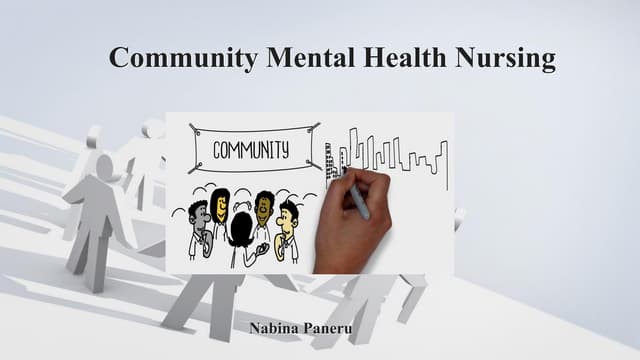Introduction
Definition of Mental Health Nursing
Mental health nursing, also known as psychiatric nursing, is a specialized field within nursing focused on the care of individuals with mental health disorders. These professionals are trained to work with patients experiencing a range of psychiatric conditions, from depression and anxiety to severe conditions like schizophrenia and bipolar disorder. Mental health nurses provide both acute and long-term care, addressing the mental, emotional, and physical needs of patients.
Importance and Relevance in Modern Healthcare
In recent years, the importance of mental health has gained significant recognition. Mental health nursing is critical in a holistic healthcare system because it bridges the gap between physical health and mental well-being. Mental health nurses help manage symptoms, support recovery, and improve the quality of life for individuals with mental health issues, playing an essential role in reducing the stigma associated with these conditions.
Overview of Mental Health Disorders and the Role of Nurses in Managing Them
Mental health disorders encompass a wide range of conditions that affect a person’s thinking, feeling, behavior, or mood. They can range from mild conditions, such as anxiety disorders, to severe mental illnesses like schizophrenia. Mental health nurses play a crucial role in identifying these conditions, providing therapeutic interventions, administering medications, and developing care plans tailored to each patient’s needs.
Historical Background
Evolution of Mental Health Nursing
Mental health nursing has evolved considerably over the past century. In the early 20th century, the role was largely custodial, focused on controlling and containing patients in asylums. However, with the deinstitutionalization movement of the mid-20th century, there was a shift towards more community-based care and the development of psychiatric hospitals that focused on treatment and rehabilitation rather than mere containment.
Key Milestones in the Development of Mental Health Services
Key milestones in mental health nursing include the establishment of psychiatric training for nurses, the introduction of psychotropic medications in the 1950s, and the move toward more person-centered care. In recent decades, there has been a stronger emphasis on recovery-oriented practices, which recognize the potential for all individuals with mental health conditions to recover and live meaningful lives.
Changes in Societal Attitudes Towards Mental Health
Society’s understanding and attitudes toward mental health have shifted dramatically. Earlier views often associated mental illness with social stigma and misunderstanding. Today, mental health is more openly discussed, and there is a growing awareness of its importance, leading to more supportive and empathetic approaches within healthcare systems. Mental health nurses play a pivotal role in advocating for their patients and educating the public to foster a more inclusive environment.
Role of a Mental Health Nurse
Responsibilities and Daily Tasks
The role of a mental health nurse is multifaceted, involving direct patient care, assessment, planning, implementation, and evaluation of patient needs. Daily tasks may include conducting mental health assessments, providing psychotherapy, administering medication, monitoring side effects, and offering support to families. Nurses also coordinate care with other healthcare professionals and advocate for their patients’ rights and needs.
The Therapeutic Relationship Between Nurses and Patients
A core component of mental health nursing is the therapeutic relationship, which is built on trust, respect, and empathy. This relationship helps in understanding the patient’s experiences and needs, providing a foundation for effective care. Establishing a strong therapeutic relationship requires time, consistency, and a non-judgmental approach, which can significantly impact a patient’s recovery journey.
Scope of Practice and Specializations Within Mental Health Nursing
Mental health nursing offers various specializations, including child and adolescent mental health, forensic mental health, substance abuse, geriatric psychiatry, and emergency psychiatric services. Each specialization requires specific skills and knowledge, allowing nurses to provide targeted and effective care tailored to particular populations.
Skills and Competencies Required
Communication and Interpersonal Skills
Effective communication is vital in mental health nursing. Nurses must be adept at both listening and conveying information clearly and compassionately. This is particularly important when dealing with patients who may have difficulty articulating their thoughts or emotions due to their mental health condition.
Empathy and Compassion
Empathy and compassion are fundamental attributes for mental health nurses. Understanding patients’ perspectives and experiences helps in providing care that is not only effective but also humane. This approach fosters trust and encourages patients to engage more openly in their treatment.
Critical Thinking and Problem-Solving Skills
Mental health nurses must employ critical thinking and problem-solving skills to assess patient needs, develop care plans, and respond to emergencies or changes in a patient’s condition. They must be able to make quick, informed decisions, especially in high-pressure situations.
De-escalation Techniques and Crisis Management
Handling challenging behaviors and crises is a significant part of mental health nursing. Nurses must be trained in de-escalation techniques to manage potentially volatile situations safely and effectively, ensuring the safety of both patients and staff.
Knowledge of Mental Health Conditions and Treatments
A thorough understanding of various mental health conditions and their treatment options is crucial. Mental health nurses must stay informed about the latest research, treatment modalities, and best practices in psychiatric care, which enables them to provide the highest level of care.
Settings and Environments
Inpatient Psychiatric Units
Inpatient psychiatric units provide intensive care for patients experiencing severe mental health crises. Nurses in these settings focus on stabilization, safety, and short-term interventions. They work closely with a multidisciplinary team to develop discharge plans that ensure continuity of care.
Community Mental Health Services
Community mental health services aim to provide ongoing support to individuals with mental health conditions in their own communities. Nurses in this setting often provide home visits, coordinate with other service providers, and assist patients in managing their conditions on a day-to-day basis.
Outpatient Clinics and Day Hospitals
Outpatient clinics and day hospitals offer patients access to treatment without the need for overnight stays. Nurses here provide assessments, administer treatments, offer psychotherapy, and support patients in adhering to their treatment plans.
Schools, Prisons, and Residential Facilities
Mental health nurses also work in schools, prisons, and residential facilities, providing specialized care to diverse populations. In schools, they may support children with behavioral issues or learning disabilities, while in prisons, they address the mental health needs of inmates, often working in challenging conditions.
Types of Mental Health Disorders
Common Disorders: Depression, Anxiety, Bipolar Disorder, Schizophrenia, Personality Disorders, etc.
Mental health disorders vary widely in their presentation and severity. Nurses must be knowledgeable about a wide range of conditions, including mood disorders (such as depression and bipolar disorder), anxiety disorders, psychotic disorders (like schizophrenia), and personality disorders. Each type of disorder requires a unique approach to care and treatment.
Role of Nurses in Managing and Treating Different Types of Disorders
Mental health nurses are involved in all aspects of managing and treating mental health disorders. This includes conducting initial assessments, developing and implementing care plans, monitoring progress, adjusting treatments as necessary, and providing education and support to patients and their families.
Case Management and Individualized Care Plans
Nurses play a crucial role in case management, coordinating care across various services and providers. They develop individualized care plans that are tailored to each patient’s specific needs, taking into account their medical history, current symptoms, and personal goals for recovery.
Therapeutic Interventions and Treatments
Psychosocial Interventions: Cognitive Behavioral Therapy (CBT), Dialectical Behavior Therapy (DBT), etc.
Psychosocial interventions are a core component of mental health nursing. Techniques such as Cognitive Behavioral Therapy (CBT) and Dialectical Behavior Therapy (DBT) are commonly used to help patients understand and change their thought patterns and behaviors. Nurses often lead group therapy sessions and provide individual counseling.
Medication Management and Pharmacological Interventions
Medication is often a key element in the treatment of many mental health disorders. Mental health nurses are responsible for administering medications, monitoring their effects, and educating patients about their use. They play a vital role in ensuring medication adherence and managing side effects.
Electroconvulsive Therapy (ECT) and Other Advanced Treatments
In some cases, more advanced treatments such as Electroconvulsive Therapy (ECT) or transcranial magnetic stimulation (TMS) may be indicated. Nurses play a role in preparing patients for these procedures, providing post-treatment care, and monitoring for adverse effects.
Role in Rehabilitation and Recovery-Oriented Approaches
Rehabilitation and recovery-oriented approaches focus on helping individuals achieve a meaningful life, regardless of the presence or severity of their mental health condition. Nurses support this process by fostering hope, supporting patients in setting and achieving personal goals, and providing ongoing encouragement and education.
Challenges in Mental Health Nursing
Stigma Associated with Mental Health
One of the significant challenges in mental health nursing is the persistent stigma surrounding mental illness. This stigma can affect both patients, who may be reluctant to seek help, and nurses, who may feel undervalued within the broader healthcare system.
Dealing with Difficult Behaviors and Ensuring Safety
Mental health nurses often work with patients who may exhibit challenging behaviors, including aggression, self-harm, or non-compliance with treatment. Ensuring the safety of all patients and staff while providing compassionate care can be a delicate balance.
Managing Burnout and Emotional Stress for Nurses
Working in mental health can be emotionally taxing, and nurses are at risk of burnout due to the demanding nature of their work. It is essential for healthcare institutions to provide adequate support and resources, such as counseling services and professional development opportunities, to help nurses manage stress and prevent burnout.

